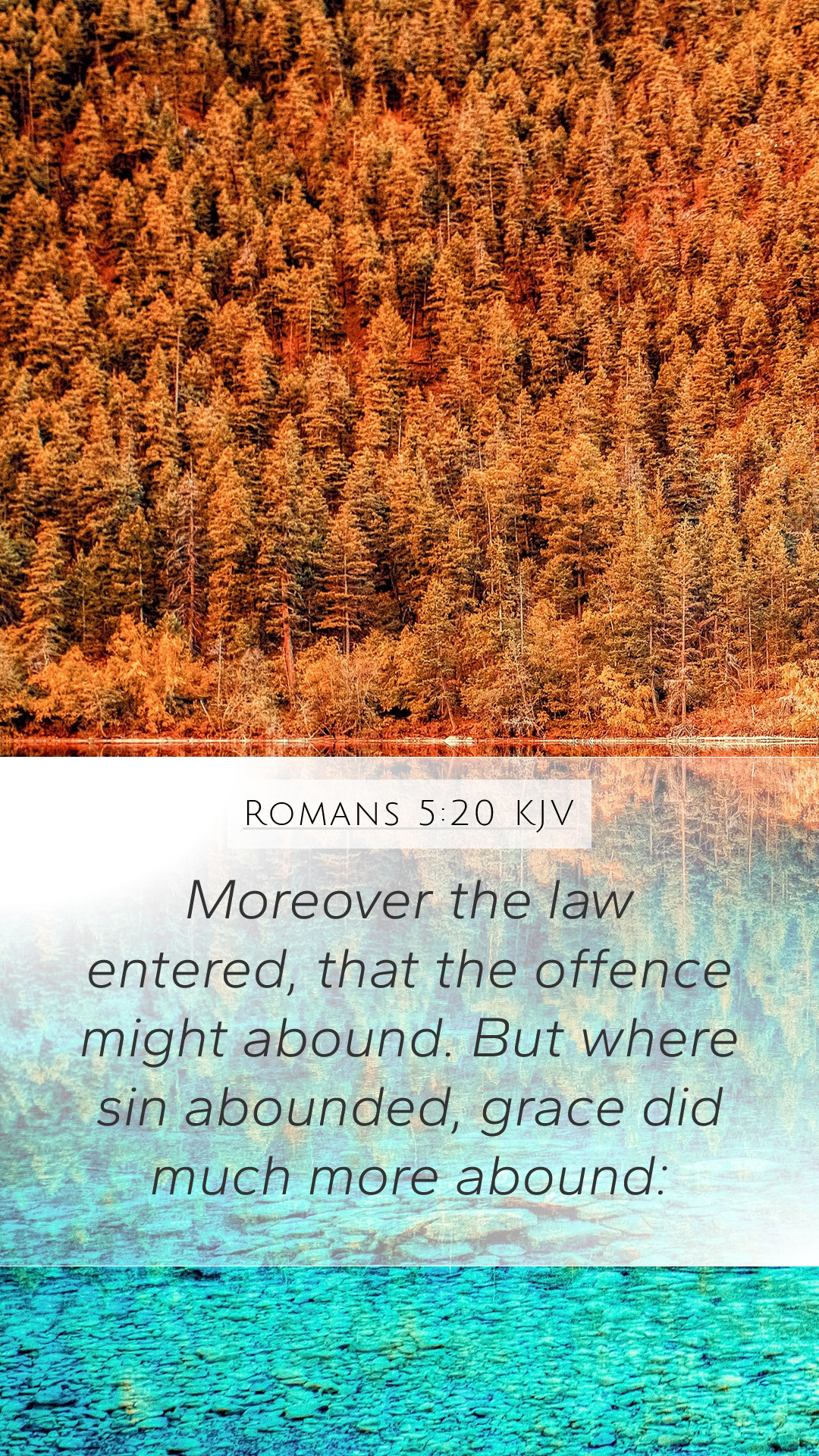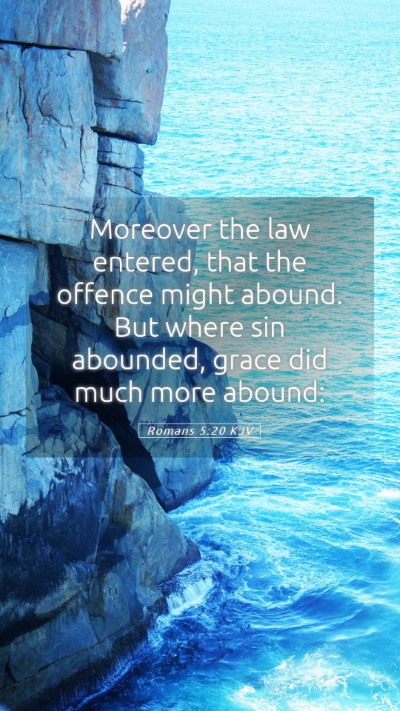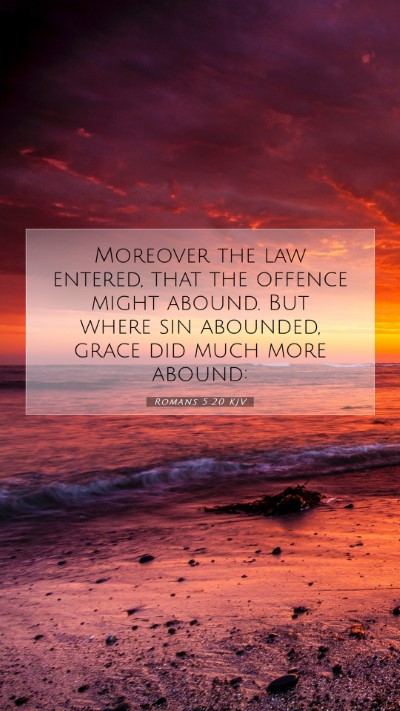Old Testament
Genesis Exodus Leviticus Numbers Deuteronomy Joshua Judges Ruth 1 Samuel 2 Samuel 1 Kings 2 Kings 1 Chronicles 2 Chronicles Ezra Nehemiah Esther Job Psalms Proverbs Ecclesiastes Song of Solomon Isaiah Jeremiah Lamentations Ezekiel Daniel Hosea Joel Amos Obadiah Jonah Micah Nahum Habakkuk Zephaniah Haggai Zechariah MalachiRomans 5:20 Meaning
What is the meaning of Romans 5:20?
Moreover the law entered, that the offence might abound. But where sin abounded, grace did much more abound:
Romans 5:20 Bible Verse Meaning
Understanding Romans 5:20
Romans 5:20 states: “Moreover the law entered, that the offense might abound. But where sin abounded, grace did much more abound.” This verse is a profound reflection on the relationship between sin and grace in the context of the Law. It emphasizes that the introduction of the Law heightened awareness of sin, yet simultaneously magnified the concept of divine grace.
Bible Verse Meanings
The meaning of Bible verses can often be deep and multi-faceted. Romans 5:20 illustrates a critical theological truth that Paul conveys throughout his epistle to the Romans. The Law, which is often viewed as a tool for morality and righteousness, inadvertently revealed the depth and extent of human sinfulness.
Bible Verse Interpretations
This verse has been interpreted in various ways by biblical scholars. Matthew Henry emphasizes that the Law was given not to provide righteousness but to expose sin. Adam Clarke discusses how the Law brings awareness of sin, yet cannot save itself.
Bible Verse Understanding
In understanding Scripture, particularly passages like Romans 5:20, it’s crucial to consider both the historical and theological context. The Law of Moses served a distinct purpose for the Israelites, but it ultimately demonstrates humanity's need for salvation through faith and grace.
Bible Verse Explanations
- Purpose of the Law: The Law's purpose was to reveal sin (Galatians 3:19) and show the need for a savior.
- Contrast of Sin and Grace: While sin increases through the knowledge of the Law, God's grace offers a remedy (Titus 2:11).
- Hope of Redemption: This verse brings hope, illustrating that no matter how great sin may be, God's grace exceeds it abundantly.
Bible Verse Commentary
Matthew Henry remarks that “the law entered, that the offense might abound,” showing that the giving of the Law was not an end in itself but a means to a greater understanding of grace. Albert Barnes further extends this by stating that the Law pointed out the extent of human depravity, making the abundance of grace all the more precious. Adam Clarke draws attention to the idea that the recognition of sin is essential for appreciating salvation, emphasizing that those who see their sin clearly are more likely to grasp the depth of God's forgiveness.
Scripture Analysis
In-depth Bible verse analysis of Romans 5:20 reveals key theological themes:
- Sin: An understanding of the seriousness of sin and its implications for humanity.
- Grace: An understanding of the superlative nature of grace as unmerited favor.
- Hope: The assurance that grace triumphs over sin (1 John 1:7).
Biblical Exegesis
Biblical exegesis of Romans 5:20 encourages believers to reflect on their need for grace. One does not come to an appreciation of grace without first confronting the reality of sin. This passage can be a valuable part of study materials in Bible study groups, providing a framework for discussing the duality of sin and grace.
Bible Study Insights
In Bible study lessons on Romans 5:20, participants can explore how the law serves as a mirror reflecting our sins. It serves as a catalyst for understanding the necessity of grace in our lives. These lessons can deepen participants' appreciation for God’s love and righteousness.
Application of Romans 5:20
The application of this verse in everyday life encourages believers to rely wholeheartedly on God’s grace. As they recognize their flaws and shortcomings, they can embrace the assurance that where sin abounds, infinite grace covers and transforms!
Cross References
Related Bible passages that provide context and additional understanding of Romans 5:20 include:
- Galatians 3:19-24 - Discusses the purpose of the law and its role in leading to Christ.
- Ephesians 2:8-9 - States that we are saved by grace through faith, not by works.
- 1 Timothy 1:14 - Highlights the abundant grace of Jesus Christ.
Conclusion
In summary, Romans 5:20 not only sheds light on the intricate relationship between sin and grace but also serves as a powerful reminder of the hope found in Jesus Christ. Engaging with this verse through Bible verse commentary, biblical exegesis, and scripture analysis opens pathways to deeper understanding and application in life. For study groups and resources, this passage stands out as a significant topic, offering profound insights into the nature of God’s grace compared to the inevitability of sin.


